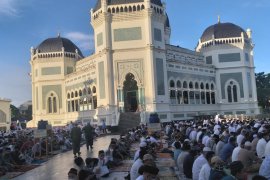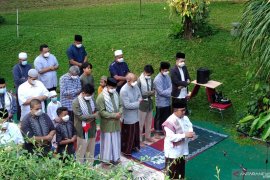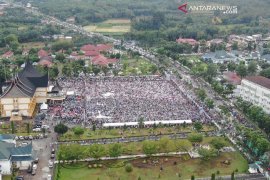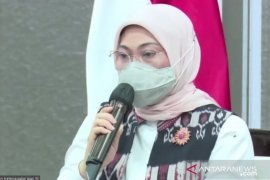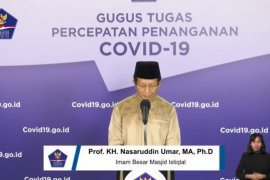The Idul Fitri festivities are to be preceded with prayers held on the first day of Syawal, succeeding month of the Ramadhan fasting month. However different methods used by the two largest Islamic organizations in deciding the first day of Syawal caused them to celebrate the Idul Fitri on different days.
In the meantime, the government announced on Monday evening that the Ramadhan fasting month ended on August 30, thus the first day of Syawal would fall on Wednesday, August 31, 2011.
The government`s decision was announced by Religious Affairs Minister Suryadharma Ali during an Itsbat session held to determine the beginning of Syawal after hearing reports on the observations of the moon in different parts of the country and inputs from a number of Islamic mass organizations.
Of the 90 observation points in Indonesia, about 30 have reported that they had not seen the new moon which would mark the first day of Syawal.
Even though the new moon was not sighted during the observation, Muhammadiyah which based its method on calculation continued its decision to end fasting month on Monday and to hold Idul Fitri prayers on Tuesday.
In Jakarta, Muhammadiyah has set at least 69 locations to say the Idul Fitri prayers. While in Bekasi, a buffer town of Jakarta in West Java, there would be 13 locations for Idul Fitri prayers, according to Muhammadiyah`s official website on Monday.
Of the 69 locations, 13 are located in Central Jakarta, fourteen locations in East Jakarta, 15 places in West Jakarta, In North Jakarta 13 locations and in South Jakarta 14 locations.
In the meantime, the central executive board of Nahdhatul Ulama decided that the first day of Syawal fell on Wednesday, August 31, 2011 because its observation teams fail to see the new moon.
"Based on reports from 90 locations none of NU`s observers saw the new moon," its general chairman, KH Said Aqil Siroj, said.
He said that because none of NU`s observation teams sighted the new moon, its central board decided that Ramadhan fasting month must be completed into 30 days (istikmal). The first month of Ramadhan this year fell on August 1, 2011, so that it would be ended on August 30.
Said Siroj asked NU executives to inform NU followers that they should say Idul Fitri prayers and celebrate it on Wednesday.
"This decision is for all NU followers in all parts of Indonesia," Said Aqil said.
Chairman of the Indonesian Ulema Council (MUI) Ma`ruf Amin has earlier predicted that Idul Fitri, Syawal 1, 1432 Hegira, was most likely to fall on August 31, 2011. "There are two ways to determine the first day of the Hegira calendar," he said.
Ma`ruf said the first way was to see it through the lunar conjunction (Ijtima) that takes place before sunset, and then the moon set after sunset. So, in this case, the moment was to be the beginning of the Hegira month, without the need to see how high the angle of the moon was when the sun sets. Muhammadiyah which claims more than 25 million followers adopted this.
The second way, Ma`ruf said, was through the sighting of the moon (rukyatul hilal), namely by directly observing the moon to determine the first day of a Hegira month. NU which is followed by some 30 million adopted this method.
According to Director General of Islamic Mass Guidance Prof. Dr Nasaruddin Umar, it is difficult to unite the decision of the Islamic mass organizations which had different methods in deciding the first day of the Syawal month.
Muhammadiyah has its `wujudul hilal (position of the moon) criteria. Others have the `Rukyatul Hilal` ( based on the sighting of the crescent/moon) method. "In the past Muhammadiyah decided that the moon is already at a hilal (seen) position when the moon based on the calculation is already at six degrees. But later it considered the six degrees position was too high, thus it lowered it to four degrees. Several years later, it lowered it again to two degrees and even now it is less than two degrees," Nasaruddin said.
"Yet, he added, astronomy experts and astrologers said it was impossible for the moon to be seen (hilal) at the position of four degrees, let alone if it is less than two degrees. The hadists (Prophet sayings) oblige that the moon must be sighted or else the days of the fasting month must be completed into 30 days," he added.
Up to now, he said, Arab countries still used the six degrees position while the Southeast Asian nations followed Indonesia`s criteria.
Besides Muhammadiyah and NU which had different days in observing the Idul Fitri festivities, there are also other small Muslim nominations who observe the festivities on different days.
Around 200 followers of the Naqshabandiyah order in Pauh Padang sub-district in West Sumatra even have celebrated Idul Fitri on Monday. They held Idul Fitri prayers at Baitul Makmur mosque, 15 kilometers away from provincial capital Padang.
"Today all followers of Naqshabandiyah in West Sumatra totaling around 8,000 people are celebrating Idul Fitri," Syafri Malin Mudo, the chief of Naqshbandiyah followers of Baitul Makmur, said.
Yet, in Banyumas, Central Java, a small group of Muslims will celebrate the end of fasting month on Thursday, September 1. "Based on our calendar that we have followed since hundreds of years ago, the Lebaran (Idul Fitri) for followers of Islam Aboge will fall this year on Thursday, September 1," Sudiworo (60), one of the group`s elders in Kracak village, said on Monday.
With regard to the differences in observing the Idul Fitri festivities, the Indonesian Ulemas Council (MUI) called on Muslims to have respect, tolerance and sincerity in facing differences on the beginning of Idul Fitri this year.
"Muslims have been accustomed to differences and thus in facing the differences (about the beginning of Idul Fitri), we have to pay mutual respect, tolerance and sincerity," MUI Chairman KH Ma`ruf Amin. (*)
Reporter: By Andi Abdussalam
Editor: Kunto Wibisono
Copyright © ANTARA 2011



